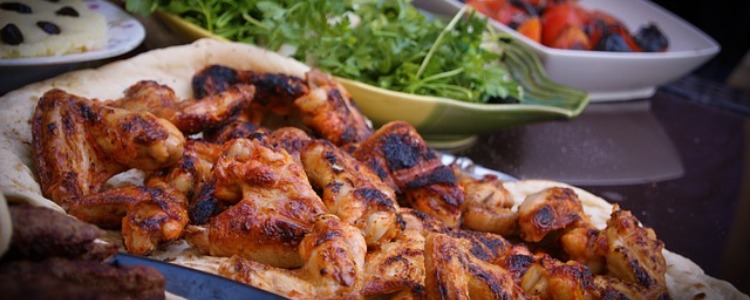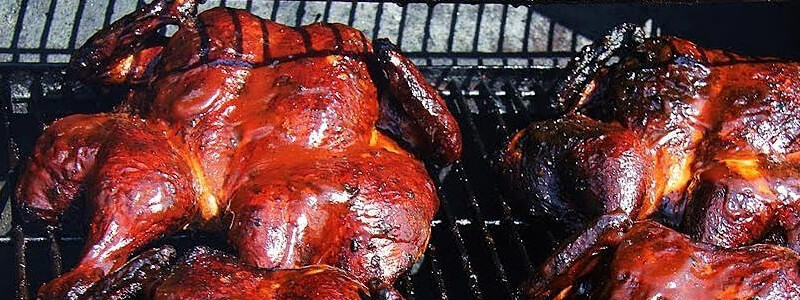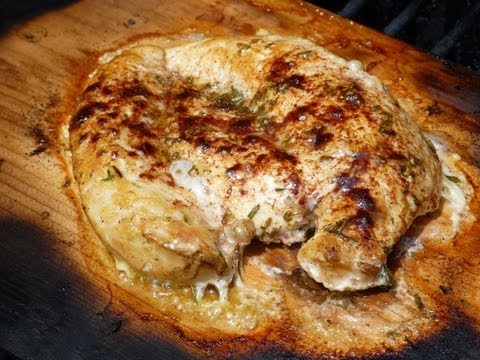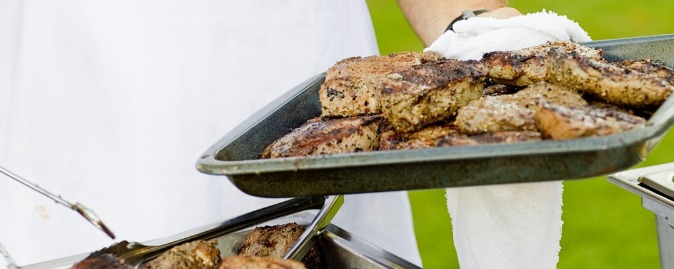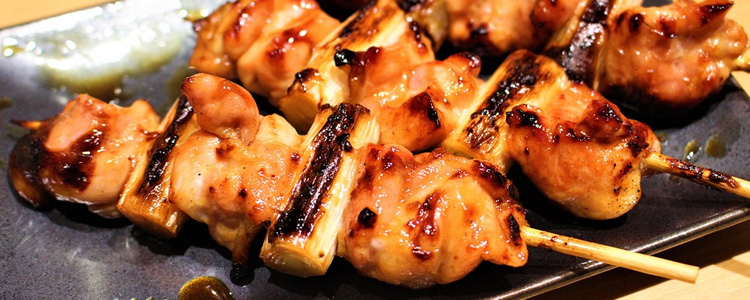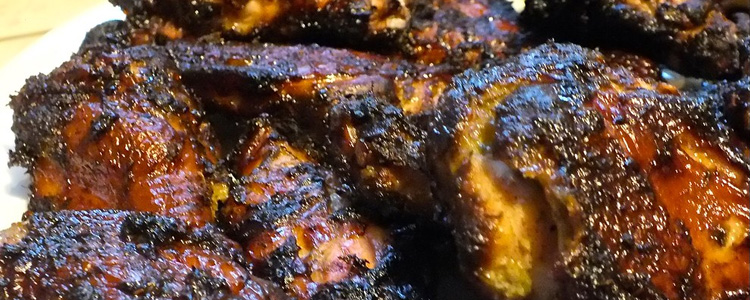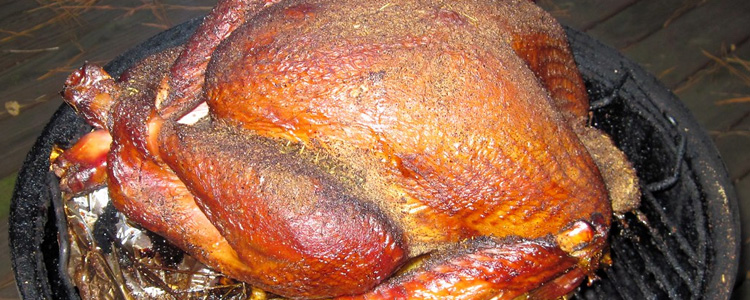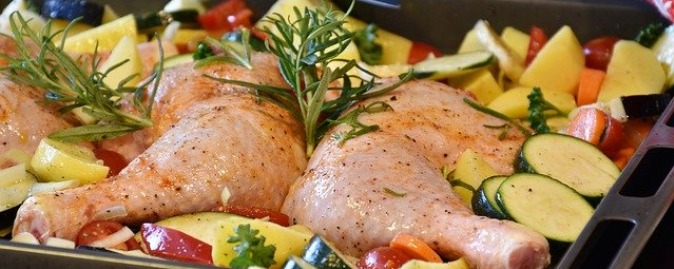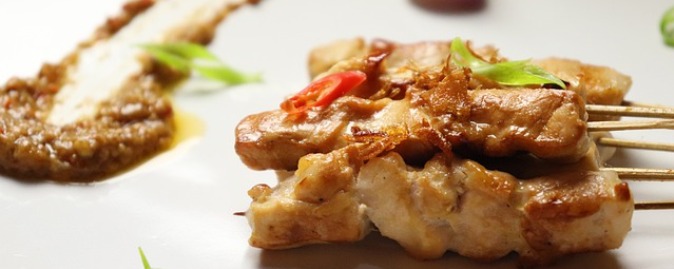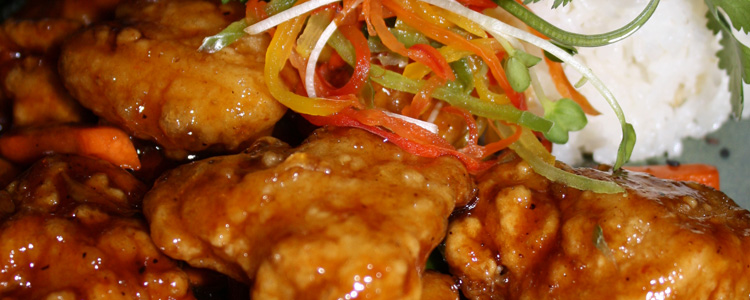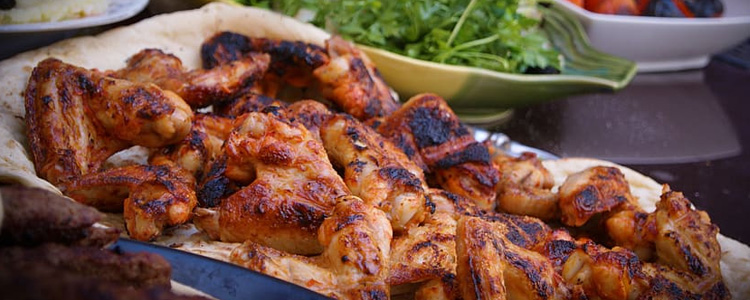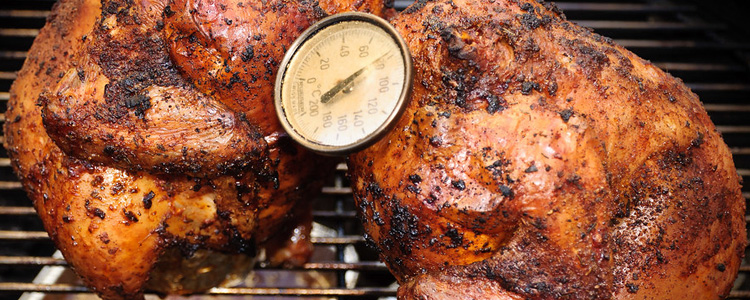BBQ Chicken recipes are versatile and often quick to make. The potentially bland taste of chicken can easily be enhanced with BBQ rubs, marinades, or sauces and techniques like barbecue smoking.
A whole chicken can be roasted on an appropriate type of barbecue, i.e. one with a lid using an indirect grilling method. So, as well as barbecue chicken, why not barbecue or BBQ smoke your Christmas goose or Thanksgiving turkey?
Here is a list of all the BBQ chicken recipes I have tried over the years – and there’s quite a diverse range of flavors.
Recipes are being added as fast as I can type them up (and photograph the product of them).
Click on the thumbnail images below to go to the recipes
Chicken and Other Poultry
Poultry is the term given to all birds reared for cooking. They are always in season and are versatile to cook with: the relatively subtle taste, in particular of chicken and turkey, can easily be enhanced with rubs, marinades and sauces .
Organically reared birds tend to have more flavor, and I always think it’s nicer to buy from a farmers market anyway – it just feels better giving a bit more money to a small scale farmer, who is passionate about what they do.
Turkey, quail, pheasant, goose or duck can’t be barbecued in the same way as you would a whole chicken.
Storing Poultry
Just as a general rule, fresh poultry should refrigerate immediately in a loose-fitting bag; without any tight packaging to allow air to circulate. It should be eaten within 3 days or so.
Fresh frozen poultry will keep for up to a year, or if it was bought ready frozen, use it within a few months.
Thawing Poultry
Frozen poultry must be thawed completely before cooking. This means it needs to be left either in a refrigerator or at room temperature to thaw – not defrosted in a microwave oven.
I have never had any problems defrosting chicken pieces in a microwave oven, but expert sources usually don’t advise this. A big chicken or modest-sized turkey probably won’t fit in the average microwave oven anyway.
So some forward planning is a need in preparing to barbecue frozen poultry and thawing time factored in.
A small whole chicken will defrost in 8 – 10 hours at room temperature. Chicken pieces, take something like 3 hours.
Duck or goose should take around 12 hours to thaw.
Turkey takes much longer, due to sheer size; 2-4 days in a refrigerator (not room temperature!), depending on size.
As a rule thawing in a ‘fridge takes something like twice as long as room temperature.
Grilling Chicken
When I grill chicken I either grill a whole chicken cut into pieces or I grill skinless, boneless chicken breasts. When it comes to cooking, each requires a slightly different approach. The flare-ups and burning chicken fat are the most difficult aspects of skin-on chicken. Skinless chicken dries out quickly and loses flavor.
To avoid flare-ups when grilling chicken pieces with the skin on, the first thing to do is not pierce the meat. This allows the fat to escape quickly and catch fire. When grilling chicken, always use tongs. The second option is to keep the chicken moving. Try to leave enough space on the grill to move the chicken pieces away from the fire. If the worst comes to the worst, move the chicken to the upper rack or turn off the grill for a minute to allow the fires to die down. When grilling chicken, the most common issue is uncontrolled flare-ups. Chicken should be cooked at a medium temperature rather than the highest setting on your grill.
If flare-ups are an issue and you don’t want to stand in front of the grill for the entire cooking time, indirect cooking is an option. There are a couple of ways to accomplish this. If using a charcoal grill, arrange the coals in a ring around the edges of the grill and cook the chicken over the area where there are no coals. If you use a gas grill, you either have a dual burner grill or you don’t. If you have dual burners, preheat both sides and turn one off before putting the chicken on. If you don’t have dual burners, make a pan out of aluminum foil and place it over the briquettes (or lava rocks) and beneath the cooking grate. Place the chicken on top of the foil. The foil will trap the fat, preventing it from reaching the burners. The disadvantage of indirect cooking is that it takes longer. Cooking time should be increased by 10% to 20%, but keep an eye on things.
When cooking skinless chicken, make sure to cover it with something to keep it from drying out. This can be as simple as a thin coat of cooking oil or as complex as a marinade. Also, flatten the chicken breasts before grilling them. If you don’t, the thin parts will dry out before the thick parts can begin to cook. Pounding the chicken with a kitchen mallet will help it cook evenly.
Of course, there is a third method for grilling chicken: using a rotisserie. Grilling chicken on a rotisserie takes time, but it’s well worth it. To prevent the chicken from burning and flare-ups, place a piece of foil directly beneath where it will spin to catch the escaping fats. You’ll also want to keep the grill temperature as low as possible to allow the inside to cook before the outside burns.
See this separate page on how to grill barbecue chicken safely
Storing Cooked Poultry
Assuming there’s any left after your BBQ, the chicken will keep for a couple of days in a ‘fridge.
Recommended Further Reading
For more inspiration for your BBQ chicken recipes, visit the following pages:
BBQ smoked Turkey
BBQ Rubs
BBQ marinades
BBQ sauce
BBQ smoking also gives an awesome flavor to poultry.
